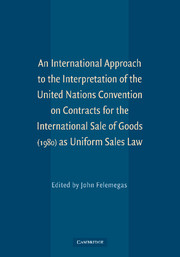Book contents
- Frontmatter
- Contents
- Foreword, by Eric E. Bergsten
- Contributors
- PART ONE INTRODUCTION
- PART TWO CISG–UNIDROIT Principles comparative editorials
- Art. 6 CISG–UP, by Bojidara Borisova [Bulgaria]
- Art. 7 CISG–UP, by Ulrich Magnus [Germany]
- Art. 8 CISG–UP, by Joseph M. Perillo [U.S.A.]
- Art. 9 CISG–UP, by Jorge Oviedo Alban [Colombia]
- Art. 10 CISG–UP, by Allison E. Butler [U.S.A.]
- Art. 11 CISG–UP, by Chantal Niggemann [Germany]
- Art. 13 CISG–UP, by Andrea Charters [U.S.A.]
- Art. 14 CISG–UP, by Jorge Oviedo Alban [Colombia]
- Art. 16 CISG–UP, by Andrea Vincze [Hungary]
- Art. 17 CISG–UP, by Stephen Smith [U.S.A.]
- Art. 18 CISG–UP, by Jorge Oviedo Alban [Colombia]
- Art. 20 CISG–UP, by John Felemegas [Australia]
- Art. 21 CISG–UP, by John Felemegas [Australia]
- Art. 22 CISG–UP, by John Felemegas [Australia]
- Art. 24 CISG–UP, by John Felemegas [Australia]
- Art. 25 CISG–UP, by Robert Koch [Germany]
- Arts. 26/39 CISG–UP–PECL, by Camilla Baasch Andersen [Denmark]
- Art. 27 CISG–UP–PECL, by Chengwei Liu [China]
- Arts. 28, 46, 62 CISG–UP, by John Felemegas [Australia]
- Art. 29 CISG–UP, by Sieg Eiselen [South Africa]
- Art. 35 CISG–UP–PECL, by René Franz Henschel [Denmark]
- Art. 37 CISG–UP, by Bertram Keller [Germany]
- Arts. 47/49 CISG–UP, by Robert Koch [Germany]
- Art. 48 CISG–UP, by Chris Kee [Australia]
- Art. 55 CISG–UP, by Jumpita Ruangvichatron [Thailand]
- Arts. 63/64 CISG–UP, by Robert Koch [Germany]
- Arts. 71/72 CISG–UP, by Sieg Eiselen [South Africa]
- Art. 74 CISG–UP, by Sieg Eiselen [South Africa]
- Art. 75 CISG–UP, by Bojidara Borisova [Bulgaria]
- Art. 76 CISG–UP, by Bruno Zeller [Australia]
- Art. 77 CISG–UP, by Elisabeth Opie [Australia]
- Art. 78 CISG–UP, by Sieg Eiselen [South Africa]
- Art. 79 CISG–UP, by Alejandro M. Garro [Argentina]
- Art. 80 CISG–UP, by Friederike Schäfer [Germany]
- Arts. 81/82 CISG–UP, by Florian Mohs [Switzerland]
- PART THREE CISG–PECL COMPARATIVE EDITORIALS
- Index
Art. 55 CISG–UP, by Jumpita Ruangvichatron [Thailand]
Published online by Cambridge University Press: 20 October 2009
- Frontmatter
- Contents
- Foreword, by Eric E. Bergsten
- Contributors
- PART ONE INTRODUCTION
- PART TWO CISG–UNIDROIT Principles comparative editorials
- Art. 6 CISG–UP, by Bojidara Borisova [Bulgaria]
- Art. 7 CISG–UP, by Ulrich Magnus [Germany]
- Art. 8 CISG–UP, by Joseph M. Perillo [U.S.A.]
- Art. 9 CISG–UP, by Jorge Oviedo Alban [Colombia]
- Art. 10 CISG–UP, by Allison E. Butler [U.S.A.]
- Art. 11 CISG–UP, by Chantal Niggemann [Germany]
- Art. 13 CISG–UP, by Andrea Charters [U.S.A.]
- Art. 14 CISG–UP, by Jorge Oviedo Alban [Colombia]
- Art. 16 CISG–UP, by Andrea Vincze [Hungary]
- Art. 17 CISG–UP, by Stephen Smith [U.S.A.]
- Art. 18 CISG–UP, by Jorge Oviedo Alban [Colombia]
- Art. 20 CISG–UP, by John Felemegas [Australia]
- Art. 21 CISG–UP, by John Felemegas [Australia]
- Art. 22 CISG–UP, by John Felemegas [Australia]
- Art. 24 CISG–UP, by John Felemegas [Australia]
- Art. 25 CISG–UP, by Robert Koch [Germany]
- Arts. 26/39 CISG–UP–PECL, by Camilla Baasch Andersen [Denmark]
- Art. 27 CISG–UP–PECL, by Chengwei Liu [China]
- Arts. 28, 46, 62 CISG–UP, by John Felemegas [Australia]
- Art. 29 CISG–UP, by Sieg Eiselen [South Africa]
- Art. 35 CISG–UP–PECL, by René Franz Henschel [Denmark]
- Art. 37 CISG–UP, by Bertram Keller [Germany]
- Arts. 47/49 CISG–UP, by Robert Koch [Germany]
- Art. 48 CISG–UP, by Chris Kee [Australia]
- Art. 55 CISG–UP, by Jumpita Ruangvichatron [Thailand]
- Arts. 63/64 CISG–UP, by Robert Koch [Germany]
- Arts. 71/72 CISG–UP, by Sieg Eiselen [South Africa]
- Art. 74 CISG–UP, by Sieg Eiselen [South Africa]
- Art. 75 CISG–UP, by Bojidara Borisova [Bulgaria]
- Art. 76 CISG–UP, by Bruno Zeller [Australia]
- Art. 77 CISG–UP, by Elisabeth Opie [Australia]
- Art. 78 CISG–UP, by Sieg Eiselen [South Africa]
- Art. 79 CISG–UP, by Alejandro M. Garro [Argentina]
- Art. 80 CISG–UP, by Friederike Schäfer [Germany]
- Arts. 81/82 CISG–UP, by Florian Mohs [Switzerland]
- PART THREE CISG–PECL COMPARATIVE EDITORIALS
- Index
Summary
INTRODUCTION
Article 55 of the Convention provides a mechanism for the determination of the price in an international sales contract that has been validly concluded; however, it does not state a price or expressly or implicitly make provision for determining the price. In other words, CISG Art. 55 deals with the uneasy question concerning open-price contracts, and it becomes a controversial provision in light of CISG Article 14(1), which provides that determination of price is one of the criteria for an offer. The two provisions seemingly contradict each other.
Counterpart provisions regulating the same issues, but in a more detailed manner, are also found in the UNIDROIT Principles of International Commercial Contracts (the Principles) Articles 5.7, “Price Determination,” and 2.2, “Definition of Offer”.
This chapter examines whether and the extent to which the provisions of the Principles may be used to aid the interpretation of Art. 55 of the Convention.
Relationship between CISG Arts. 14(1) and 55
CISG Art. 14 generally deals with the criteria for an offer, and Art. 14(1) expressly provides that for an offer to be sufficiently definite, the price must be expressly or implicitly fixed or a provision must be made to determine the price.
A proposal for concluding a contract addressed to one or more specific persons constitutes an offer if it is sufficiently definite and indicates the intention of the offeror to be bound in case of acceptance. A proposal is sufficiently definite if it indicates the goods and expressly or implicitly fixes or makes provision for determining the quantity and the price.
- Type
- Chapter
- Information
- Publisher: Cambridge University PressPrint publication year: 2007



